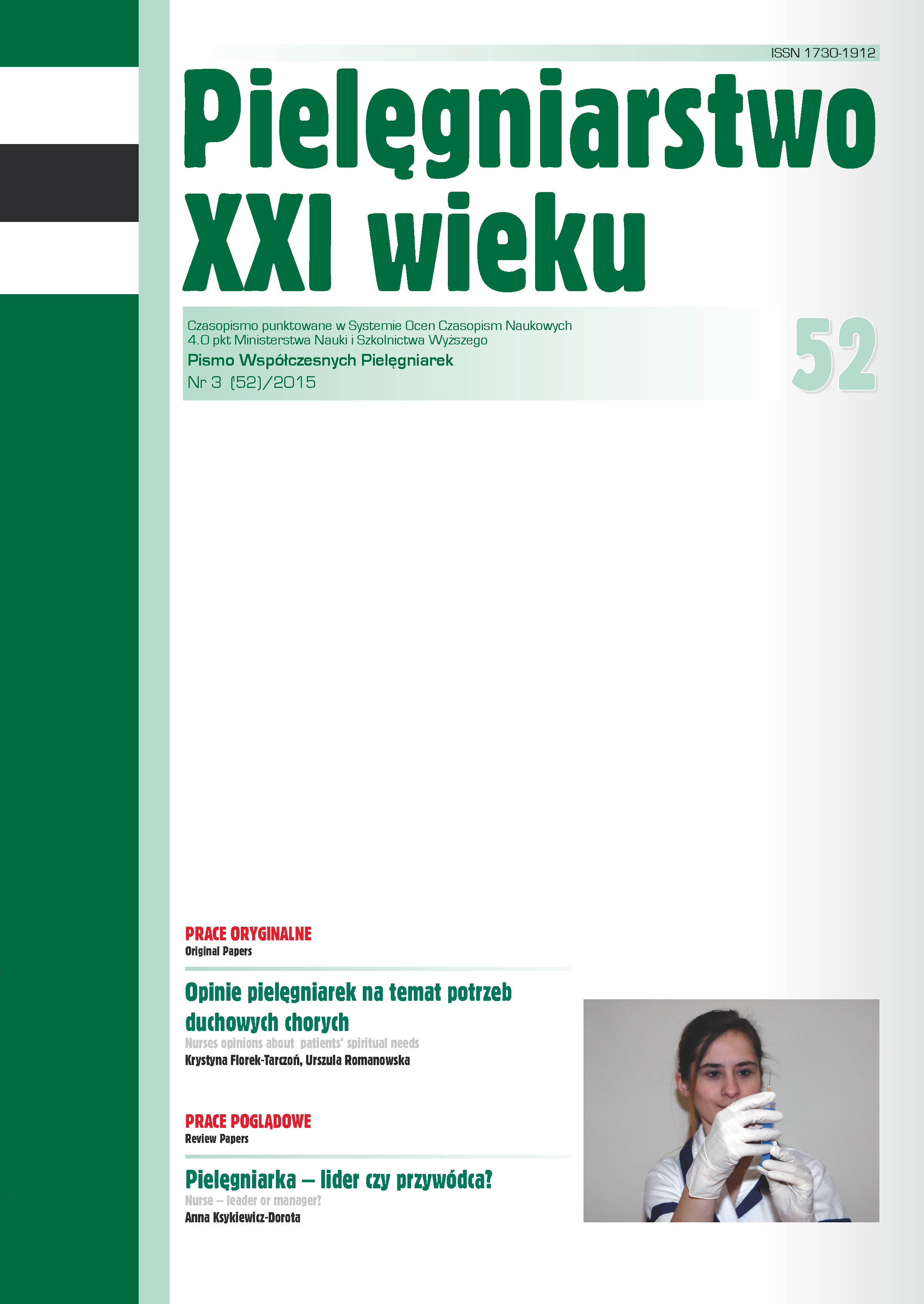Nurses opinions about patients’ spiritual needs
DOI:
https://doi.org/10.12923/p21w-2015-3/28Keywords:
nurses, the ill, spirituality, careAbstract
NURSES OPINIONS ABOUT PATIENTS’ SPIRITUAL NEEDS
Introduction. The patient’s spiritual needs are an important part of providing hospital care. Health care providers often fail to take the patient’s spirituality into consideration. The patients’ religious needs are often ignored and omitted while preparing care plans. These issues should be looked at by both the members of therapeutic teams and religious ministers. The Polish law regulates allows patients to have access to religious care. Preparing nurses to assist in realizing is an important part of education preparing to care.
Aim. The aim of the study was to elicit nurses’ opinions about the patients’ spiritual needs and the role of nurses in the implementation of spiritual care.
Material and method. The study included 88 nurses working in health care sector in the province of Malopolska, currently studying at Higher Vocational School in Tarnow majoring in nursing through part-time first-cycle studies (bridging) and the second-cycle studies. The study was conducted in November 2013. Due to its specificity, it has not required obtaining any approval papers from the Bioethical Committee. The authors conducted the study using a diagnostic survey with a questionnaire of their own making.
Results. A vast majority of the respondents (76.1%) believe that the spiritual needs of patients are often ignored by health care providers. Some 98.9% of students (participants in the study) stated that nurse should actively participate in identifying and meeting spiritual needs of patients. According some 80.7% of the participants, most employers do not gather any information regarding the patients’ worldview or religious needs.
Conclusions. Studies have shown that:
1. Spiritual needs of patients are rarely included in care plans.
2. Nurses should participate in identifying and meeting spiritual needs of patients.
3. Health care institutions rarely collect any information about the worldview and spiritual needs of their patients.
References
1. de Walden-Gałuszko K, Kaptacz A. Pielęgniarstwo w opiece paliatywnej i hospicyjnej. Warszawa: PZWL;2005.
2. Uchmanowicz E. Potrzeby duchowe i wsparcie psychologiczne ludzi będących u kresu życia w kontekście opieki hospicyjnej. Pielęgniarstwo i Zdrowie Publiczne. 2012; 1(6):67-72.
3. Nolan S, Saltmarsh P, Leget C. Opieka duchowa w opiece paliatywnej: prace nad utworzeniem Grupy Roboczej EAPC. Medycyna Paliatywna w Praktyce. 2012 2(6):57-61.
4. Ustawa o zakładach opieki zdrowotnej z dnia 30 sierpnia 1991 r. (art. 19 ust. 3 pkt. 3).
5. Ustawa o prawach pacjenta i Rzeczniku Praw Pacjenta z dnia 6 listopada 2008 r. Dz. U. 2009 nr 52 poz. 417.
6. Pawlak Z. Opieka duchowa w terminalnej fazie choroby. [W:] Nowa Medycyna. Ból i opieka paliatywna [online]. Dostępny na: http://www.czytelniamedyczna. pl/1318,opieka-duchowa-w-terminalnej-fazie-choroby.html [dostęp z dnia 13.02.2014].
7. Krzyżanowska-Łagowska U. Wartości duchowe w etosie pielęgniarskim. Kraków: Wydawnictwo Ad Vocem; 2005.
8. Taylor EJ. Co powiedzieć? Jak rozmawiać z chorym o duchowości? Kraków: Wydawnictwo WAM; 2008.
9. Puchalski CM, Lunsford B, Harris MH, et al. Interdisciplinary spiritual care for seriously ill and dying patients: a collaborative model [online]. Dostępny na http://www.ncbi.nlm.nih.gov/pubmed/17034676 [dostęp z dnia 4.06.2014].
10. Krajewska-Kułak E, Mickiewicz I, Lankau A, i wsp. Opinia studentów kierunku pielęgniarstwo na temat możliwość i potrzeby realizacji praktyk religijnych w hospicjach – doniesienie wstępne. Problemy Higieny i Epidemiologii. 2010, 91(4): 672-677.
11. Mickiewicz I, Krajewska-Kułak E, Kędziora-Kornatowska K, i wsp. Opinie zawodowo czynnych pielęgniarek na temat opieki paliatywnej. Medycyna Paliatywna. 2011; 3: 151-162.
12. Krasuska ME, Stanisławek A, Turowski K. Standardy w pielęgniarstwie onkologicznym i opiece paliatywnej. Lublin: Akademia Medyczna; 2005.
Downloads
Published
Issue
Section
License
Copyright (c) 2015 Krystyna Florek-Tarczoń, Urszula Romanowska (Autor)

This work is licensed under a Creative Commons Attribution-NonCommercial-NoDerivatives 3.0 Unported License.




